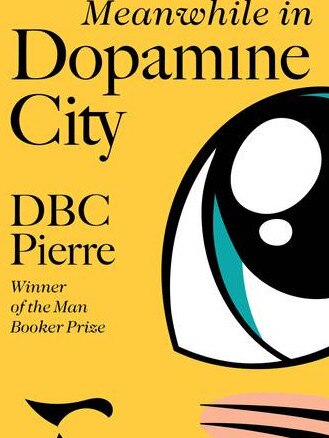Review, Australian Booker Prize winner DBC Pierre’s Meanwhile in Dopamine City
Australian Booker Prize winner DBC Pierre sinks the stiletto deep into our digitally dependent society in his satirical new novel.

DBC Pierre’s new novel, Meanwhile in Dopamine City, explores the largest, swiftest and most inexorable migration in history: that of individuals to social media. The genius of these online platforms lies in the Faustian pact they offer. The warm clasp of the digital crowd is paid for by a flattening of the enigma of the self, its rich complexity reduced to a moronic yet immensely profitable binary of cancels or likes.
Combine this with a society where Artificial Intelligence and robotisation supercharge the immiseration of the 99 per cent — a culture in which our larger worth is tied to credit ratings decided by algorithms linked to an online beer promotion — and you have a dystopia not all that dissimilar to the world we now inhabit. A world whose all-encompassing awfulness is built on our enthusiastic embrace of the digital in favour of a reality less and less amenable to ordinary human thriving.
Pierre’s near-future US is a nation where old certainties about the self and its relationship to the social realm have been shattered by technological revolution and economic shifts. Its people have imprisoned themselves in epistemic bubbles and echo chambers, silos where individuals consort only with those who share their attitudes and beliefs.
Concerned as it is with the efforts of an American Everyman to hold his family within nuclear bonds despite the centripetal forces of disruption, Pierre’s story comes embedded with certain assumptions about human connection and the traditional parameters of interior life.
Ostensibly it is a social satire, and so part of a literary tradition that runs all the way from Apuleius to George Saunders. Yet it is also a narrative that registers and embodies in formal terms that recent rupture in those assumptions outlined above. In this respect, Meanwhile in Dopamine City is not a novel so much as it is novel-adjacent.
Speculative experiments like this one are nothing new for Pierre. The author has, over the course of four fictions published since 2003, when his debut Vernon God Little became the first novel to win both the Booker Prize and the Whitbread Award, proven a louche and clear-eyed narrator of our contemporary crazy.
Whether writing of the suicidal insanity of American gun culture, the Ouroboros-like nature of contemporary media or end-times decadence of foodie affectations, the Australian-born author has been unerring in his efforts to extrapolate from current conditions, to project and then depict the forces we have set in play.

For residents of Dopamine City, an exurban outpost somewhere in the desert inland of the US West Coast — a working-class town more recently absorbed into Silicon Valley’s sprawling complex — the news Pierre brings is dire.
Lonny Cush is old enough to remember the post-war compact of honest labour in return for a decent wage, with a degree of employment stability permitting a leg-up into the middle-class. But he is young enough to have been caught in its demographic endgame.
Recently retrenched from his job as a sanitation worker, trapped in a frozen grief for a wife who died years before, Lonny knows only one thing with certainty: he has signally failed to protect his children from the blandishments and dangers of the digital.
His daughter Shelby is only nine but she is already glued to social media (the primary platform of the day is called Riker, like the prison) and gunning for a smartphone. Her older brother Eagan has long disappeared into his room and the alternative reality of online gaming.
What raises Lonny’s concerns from engaged parental care to borderline paranoia is the fragility of his domestic situation.
Lonny married up; his mother-in-law never fully accepted him. Nor did she forgive him for, in her view, allowing her beloved daughter to die. She subsequently fought for and gained legal custody of Shelby. Only recently has she been returned to her father’s care.
Lonny’s evident decency is undercut by the redundancy of its expression. He is incorrigibly analog, a superannuated man in every respect.
And while the novel is built around the drama of his decision to submit to the online world as a means of reconnoitring for safe spaces ahead of Shelby, it also shows how feeble old virtues prove when faced with the tsunami of diversion and temptation the web provides.
Yet Lonny is too plain and solitary a receptacle to capture all this digital rush. Pierre instead turns to a polyphony of voices to braid with and add theoretical polish to his hero’s blunt instinct.
The fellow ‘‘pipe monkeys’’ with whom Lonny works become, by pure accident, social media mavens, while teachers, neighbours and old flames of our hero add layers of perspective to his situation.
Meanwhile, a rising tech entrepreneur named Bastien buys the faded mansion down the road from Lonny’s place, only to turn it into a drone-encircled theme park.
It is left to Dr Cornelia Roos, an academic hired by Bastien to provide cover for his firm’s next digital land-grab — a ‘‘declinist technophobe battle-axe’’ mathematician who reads algorithms like augurs read entrails — to say the things Lonny feels but cannot clarify:
‘‘Do not use the words free speech!’’ she tells her employer, a would-be libertarian,
Free speech I practise with you directly to promote a meeting of minds. This is not free. Every second an arm like a blade combs the surface of the earth for dopamine, yours and mine, our whims and arguments, our relationships with others, our attempts at love, our anger, our caring, to embezzle it as revenue for a dozen male college dropouts.
Here, amid Dr Roos’s righteous umbrage, lies the great strength of Pierre’s novel: there is a surfeit of righteous umbrage to go around. Whenever possible, in a manner stylistically appropriate to the subject at hand — that is, sharp sociological critique sheathed in dead-on vernacular — the author sinks the stiletto deep.
The blending of registers can sound like dread, as when Lonny reluctantly joins his daughter’s school chat group and is immediately inundated with notifications:
His brain had learned over millions of years to sift data for meaningful patterns; but the math had changed overnight. The number of events in the stream of his mind was now multiplied by the number of his contacts and feeds, till he was suddenly connected to a greater sum than there were atoms across the universe.
They can also play out as pitch perfect satire. Like this description, from the sanitation workers’ perspective, of the tech firm that has turned Dopamine City into a company town:
The Octagon was Company headquarters: an ecologically sustainable architectural marvel and equal opportunities ‘‘achievement space’’ committed to global community. To the rats it was a wealthy day care centre with optimistic drainage, full of trendy gamers who looked like they didn’t do much not doing much and spending the rest of their time designing spaces where doing anything looked wrong.
Yet if there’s a flaw in Welcome to Dopamine City, it emerges from this same synergy between voice, form and material. So keen is Pierre to replicate the experience of the digital on the printed page, he resorts to twin columns running parallel: one in full ink, narrating Lonny’s experience and that of those in his orbit; and the other, faded, with portions highlighted to catch the eye, which provide the social media meta-commentary inspired by, or absurdly disconnected from, that primary tale.
The result is a book that does such a good job replicating the sense of distraction and disorientation furnished by social media — its wholesale enclosure of our attentional commons — it all but admits its own obsolescence.
So precisely does Pierre mirror the shallow uncanny of the online world, he unravels the literary form employed to critique it.
Given the scale of the challenge, however — the hydra-headed nature of the beast the novelist has set out to kill — it is only fair to offer DBC the same bleak exoneration he offers Lonny Cush when considering the man’s valiant, worthy, and ultimately doomed effort to keep his kids offline: ‘‘He didn’t stand a f..king chance.’’
Geordie Williamson is chief literary critic of The Australian. Meanwhile in Dopamine City by DBC Pierre (Faber, 400pp, $29.95).







To join the conversation, please log in. Don't have an account? Register
Join the conversation, you are commenting as Logout